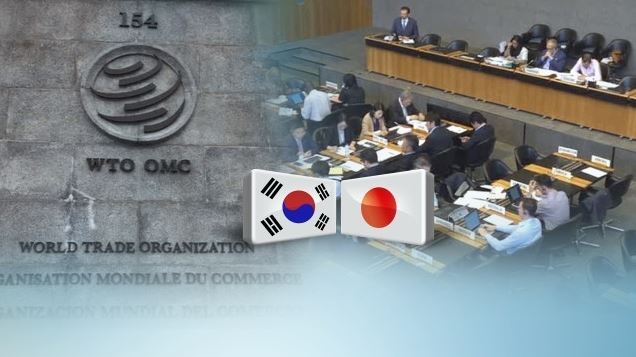SEOUL — South Korea is sparing no efforts to persuade the international community to press Japan to withdraw its export restrictions on hi-tech materials and impugn Tokyo’s reasoning behind its retaliatory measures.
Early this month, Japan announced it would curb exports on Korea’s hi-tech materials crucial to the production of chips and display panels. It also said it plans to remove South Korea from a whitelist of 27 countries that receive preferential treatment for trade with Japan. The Japanese Cabinet will consider a revision of the relevant legislation after pooling opinions by Wednesday.
Also this week, at the request of the Korean government, the World Trade Organization’s General Council is slated to discuss the two nations’ trade dispute at its meeting on Tuesday and Wednesday.
The general council, which is the WTO’s highest decision-making body in Geneva, is not the main body to settle trade disputes. But the Korean government aims to inform other members of the unfair measures taken by Japan before officially taking it to the Dispute Settlement Body.
In its complaint, the Korean government is likely to quote articles of the General Agreement on Tariffs and Trade — which are still in effect under the WTO framework — to counter Japan’s moves to exclude it from the whitelist and its restrictions on key tech materials.
GATT was a legal agreement between many countries, whose overall purpose was to promote international trade by reducing or eliminating trade barriers such as tariffs or quotas. Although it was succeeded by the WTO in 1995, the original text is still binding.
Article 1 of GATT specifies that a country must offer the same terms to the whole world, not just one country. Article 11 prohibits quantitative restrictions on the importation or the exportation of any product among member nations.
The representatives are expected to be Ambassador Paik Ji-ah, Seoul’s top envoy at its permanent mission in Geneva, and Shingo Yamagami, director-general of Tokyo’s Foreign Ministry’s economic affairs bureau.
Alongside the council, South Korea’s Ministry of Trade, Industry and Energy plans to deliver an opinion this week to the Japanese government to press it to withdraw the export curbs.
“The opinion will be a synthesis of the iniquity of Japan’s measures on export curbs. It will include all the grounds and evidence that can back the stance of the Korean government,” said an official of the Industry Ministry.
Following working-level talks between the two nations on July 12, which ended without progress, the South Korean officials have continued to suggest holding another meeting before Wednesday, but have not received a reply. Wednesday is the deadline for the Japanese government to gather opinions on the amendment of its presidential decree, which will determine whether it excludes Korea from its whitelist.
Amid the escalating trade row with Japan, impact of the US-China trade war and global electronics sector downturn, Korea saw a sharp fall in exports from January to April this year.
The world’s seventh-largest exporter reached $181 billion in exports from January to April, a 6.9 percent drop from the same period last year. Japan also saw a 5.6 percent slump during the same period.
Rajiv Biswas, Asia-Pacific chief economist at IHS Markit, said any protracted disruption of Japanese exports of the key materials to Korea could disrupt the global electronics supply chain since the country is a dominant global producer of memory components used in many electronics products.
“If the bilateral trade frictions significantly disrupt Korea’s electronics supply chain, this could be a further negative factor for the global electronics industry outlook.”
On Sunday afternoon, SK hynix CEO Lee Seok-hee left for Japan to visit the firm’s partners to discuss the supply issues of chip raw materials, the company said.
Earlier on July 7, its bigger chip rival Samsung Electronics’ leader Lee Jae-yong had also flown to Japan to meet material suppliers during his six-day trip. Upon his arrival, Lee had immediately called for a contingency plan to deal with Japan’s export curbs.


